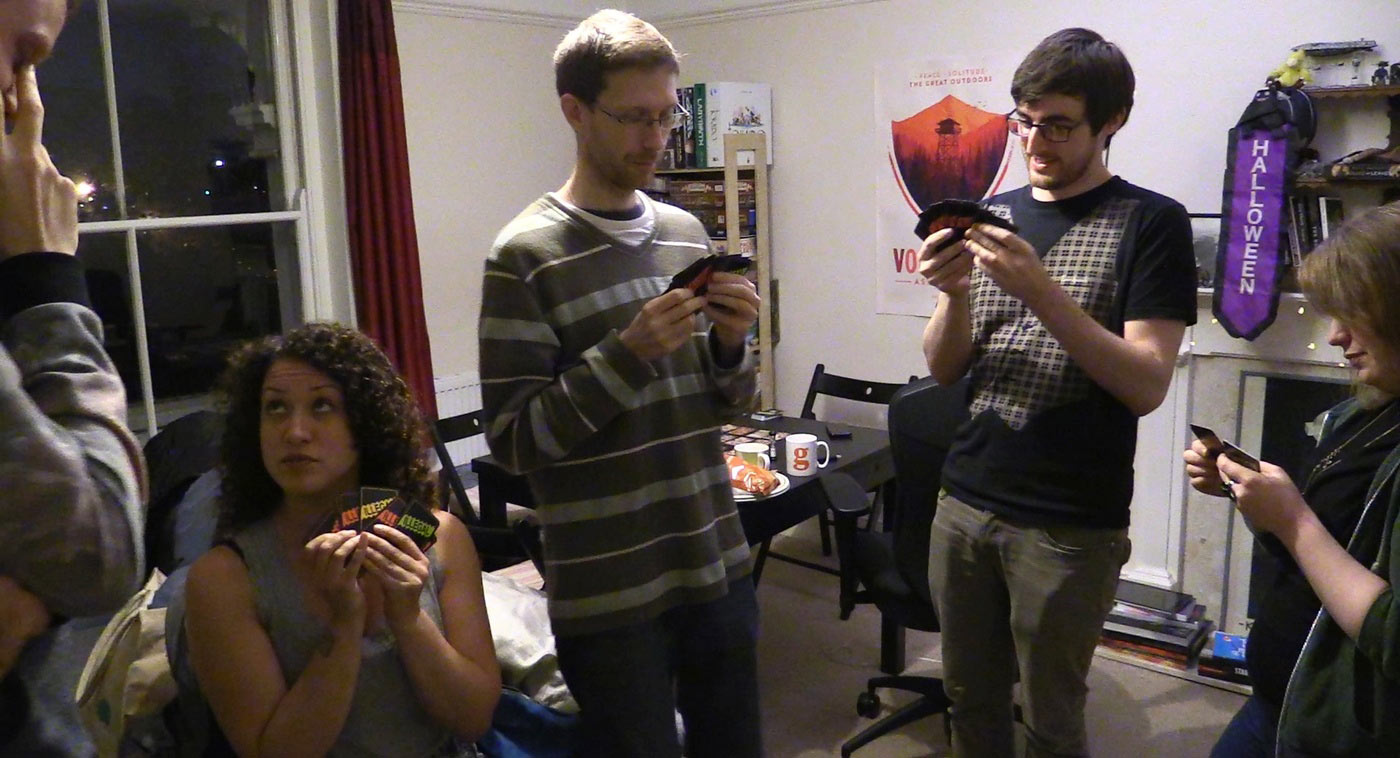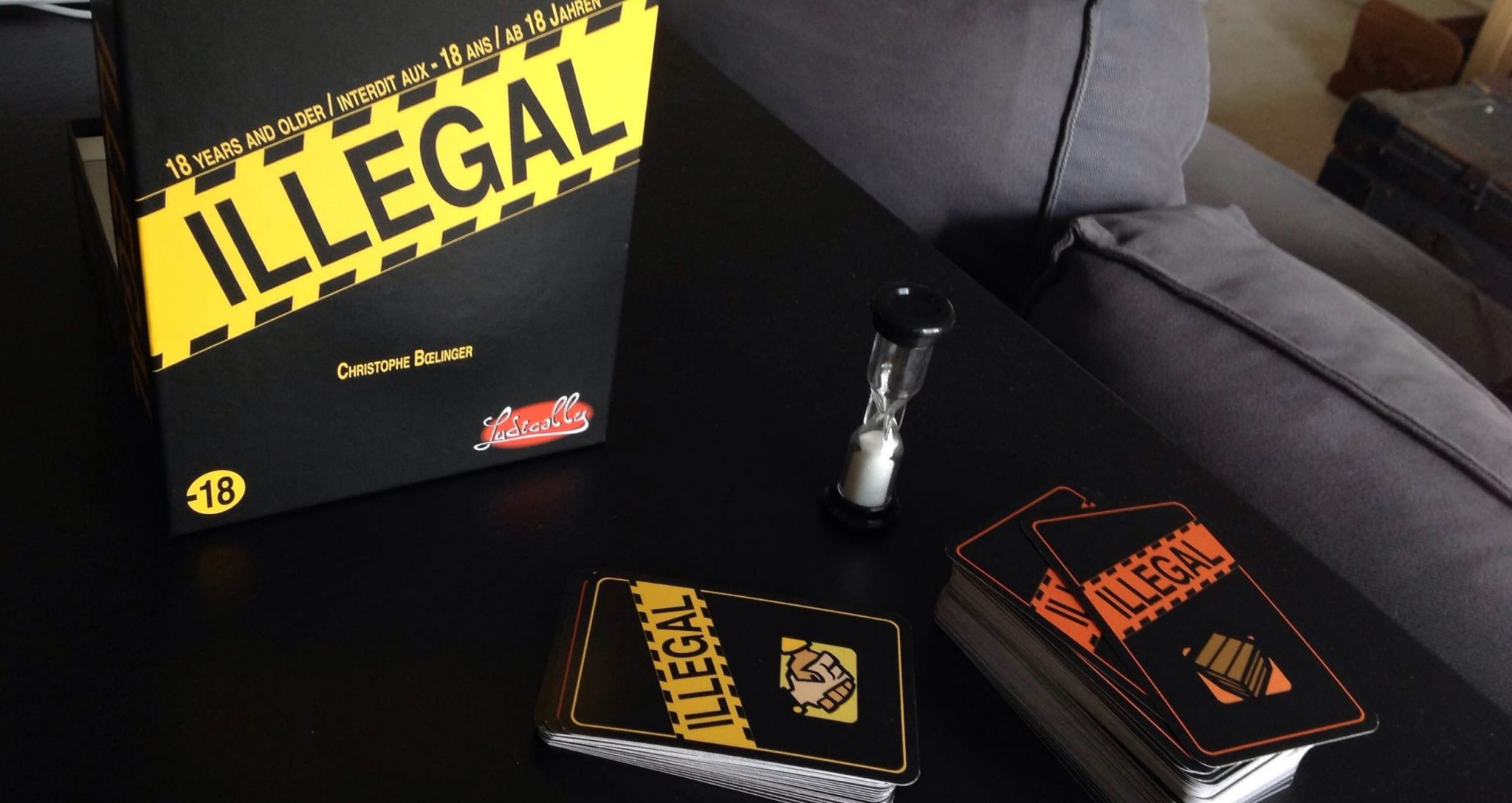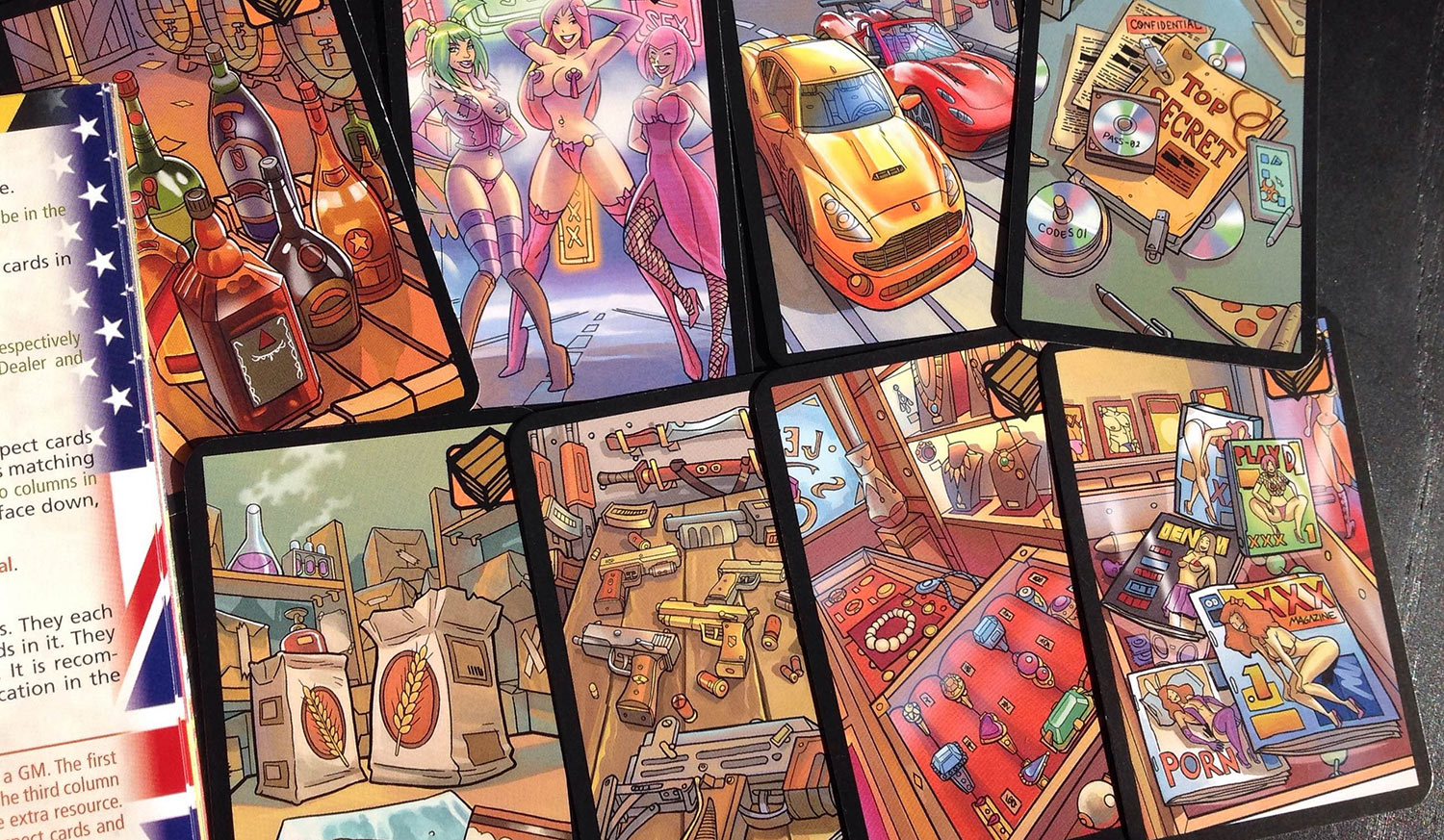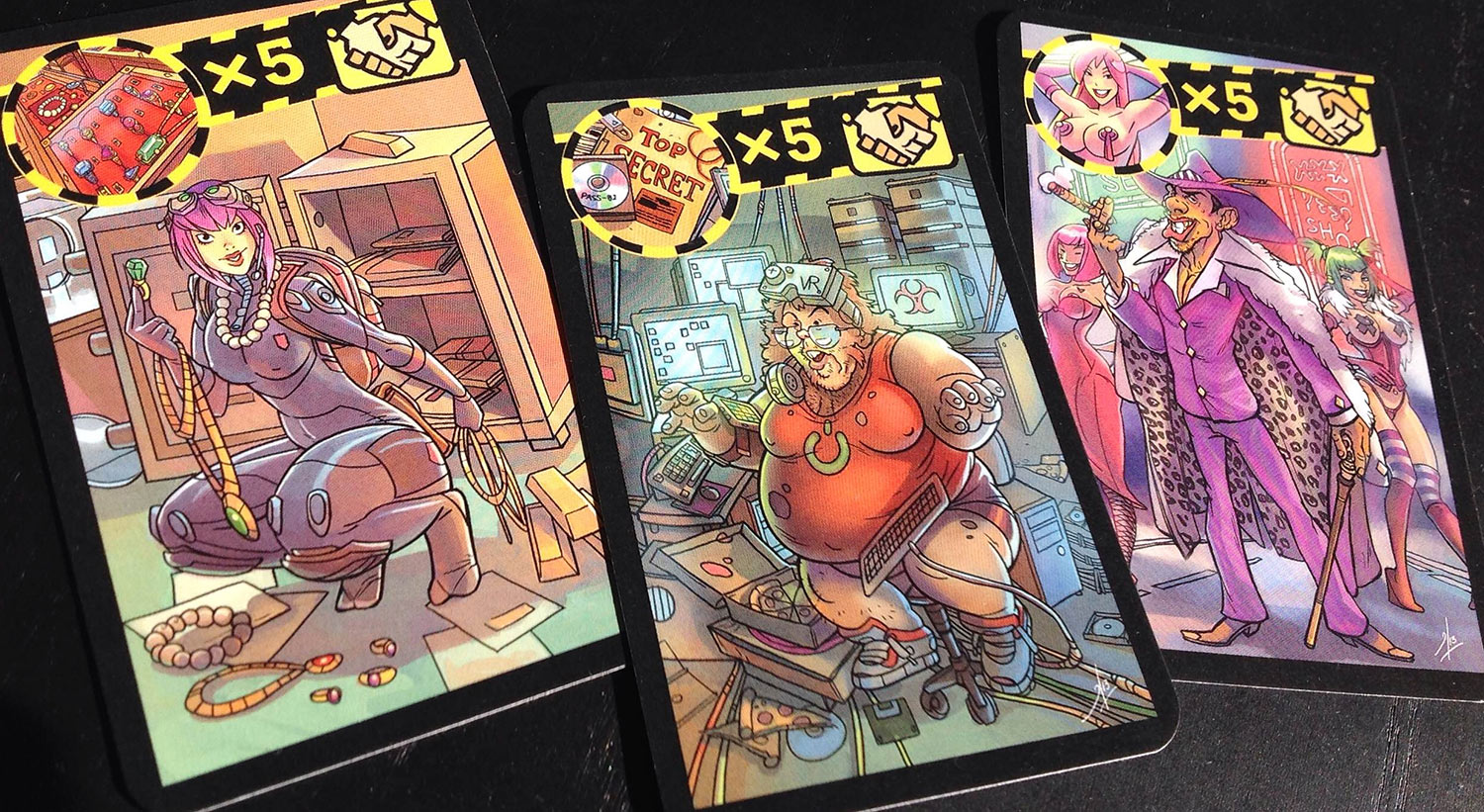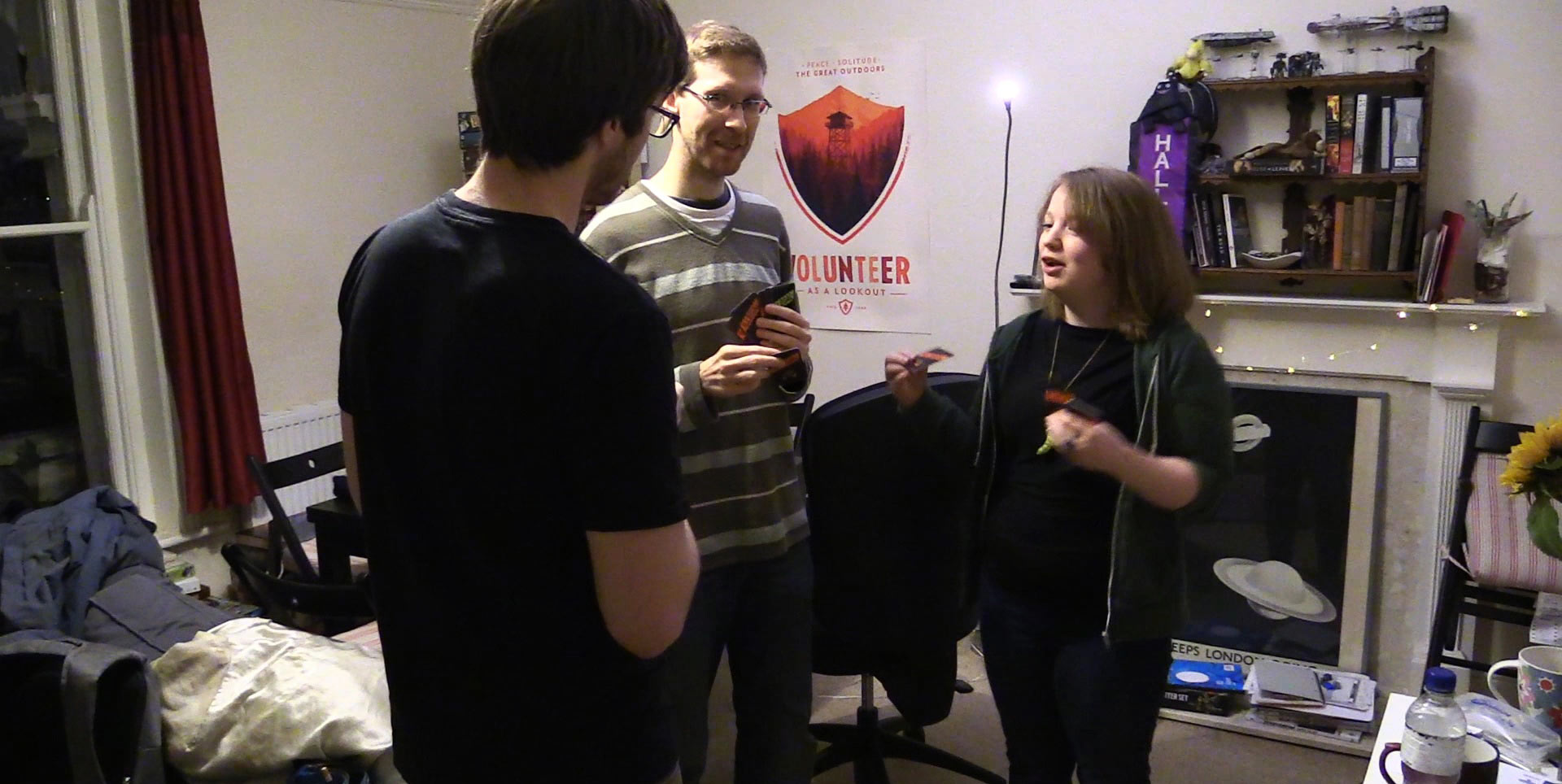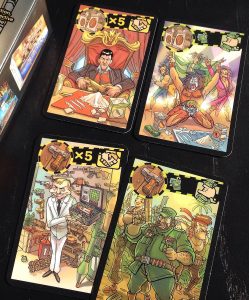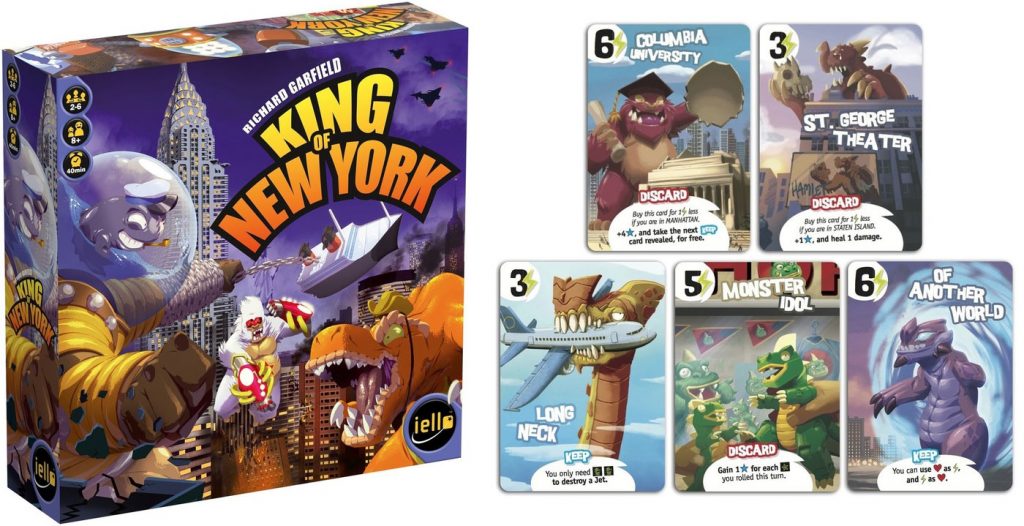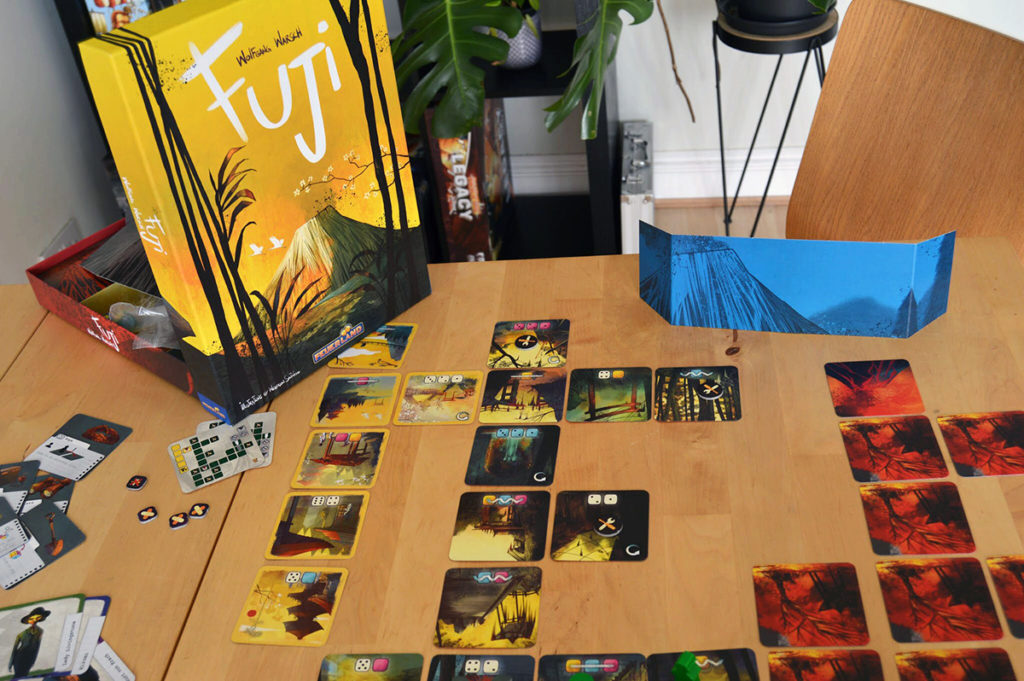Quinns: Pip, can I tell you about my favourite moment in our game of Illegal?
Pip: Go on then.
Quinns: It was when I crossed the living room to see you and Paul conducting the worst drug deal ever. “Do you want a drug?” he asked, in the embarrassed tones of someone asking if you needed the toilet. “It’s a good drug. It’s good! Do you want a drug, or maybe two?” I was laughing so hard that I ruined your transaction from across the room.
Pip: Maybe that would be a really good strategy if you were a real drug dealer – being so awkward and middle class about it all that the police think it’s a double bluff and don’t bother arresting you.
Quinns: Hang on. Was Paul actually dealing drugs in my house?
Pip: So! Tell us more about Illegal [RUN PAUL, RUN]
Quinns: Yes, OK. Illegal is a card game for 5-9 players where everybody secretly wants something, which is secretly being sold by somebody else. So maybe when the game starts you’re a secret porn dealer with five porn cards and one other random card, with the secret objective of gathering as many gun cards as possible. Another player might secretly be trying to trade guns for cars, and so on. Things only get more secret once you start playing, with players walking around the room, secretly secreting their grubby goods in dingy trades that dilute their original stock, returning to the table every three minutes to collect one new card from the “docks”.
Why are you being so secret? Because after eighteen minutes you all return to the table for the game’s surprise second phase, where you all try and get one another arrested.
Pip: In round two you’re supposed to use your knowledge of which cards people passed on to you and which cards they were seeking to figure out what they were dealing in and what they were collecting. So if someone had repeatedly given porn cards to other players you could assume they were the porn dealer. If they were asking for nothing but booze, you could work out that’s what they were in the market to buy. You get three minutes to argue it out for each dealer/collector pair and then everyone makes an accusation. The person with most fingers pointing in their direction is thus accused. If we get it wrong they gain points, but if we get it right they lose a whopping ten points, knocking them out of the running with the force of a baseball bat.
You’ll also get points for each of the cards you collect for the commodity you were in the market for. There’s nothing weird here – the highest number of points wins you the game. It’s exactly like real crime.
Quinns: Right. And just like real crime, the concept of Illegal got me SO excited.
Because I am awful, I’ve recently been spending a lot of my time thinking about games that are elastic in the space they take up. Games that can transform a table are cool, but what’s cooler are games that expand to fill a room, or even spill over to the rooms outside it. It’s why I love Two Rooms and a Boom, and in Illegal it’s great fun to simply wander the room and chat to people, or stick your nose in their deeply private dealings.
Pip: If you like things which expand to fill the available space, you’ll love gases.
Quinns: I love gases!
Pip: They’re not one of the commodities, sadly. What did we have? Porn, cars, guns, booze and drugs, right?
Quinns: Ah right. Yeah. That actually brings us skidding towards my first criticism, which was that I chose the goods we were playing with out of the game’s eight resources to avoid as much grossness as possible. Cartoony call girls are one of the resources, together with their black pimp. Top Secret Information is another one, though that has a “Hacker” dealer card that wants you to have a good laugh at fat nerds. Meanwhile, the Jewel Thief card is all nipples. Not literally, which would have at least been interesting.
Pip: Yeah, I saw some of those cards when we were putting the game back in the box and the game wasn’t trying to do anything clever with them, they were just boring stereotypes.
Quinns: It’s so lazy! I’ve just now looked more closely and one of the sex workers is missing a tooth.
Pip: It’s a difficult one. The game’s premise means those things are likely to be included as categories, but to some extent the art design made all the categories still more problematic. It also raises other questions – I mean, we were fine with guns being in the game, being bought by a South American dictator. But with smarter mechanics and more inventive/far less cliché-ridden illustrations it could have done more.
Quinns: Let’s move on to mechanics then. Because this is a weird one. I did enjoy myself throughout, because the game’s pitch is hugely strong. Just walk around striking deals with your friends! Like, telling Brendan you KNOW he’s got more cars for you and having him wince because you’re talking too loudly. And then the second half is accusations and trying not to sweat visibly when your pairing of dealer and buyer comes up and your friends are all discussing who it could be. Fantastic.
Yet the instant we finished and our responsibilities changed from “lying” to “discussing the game”, we all agreed that it just didn’t work.
Pip: Well, I was doing less of the social role playing side of things because I’d gone for a different strategy. Remember my illegal lottery?
(Pictured: Pip coaxing Paul and Brendan into her illegal lottery)
Quinns: Your RIGGED illegal lottery, wherein two wrongs combine into a giant Voltron of wrongness that smashes everybody. I never actually took part, I just heard the shouts of other players who took part in it.
Pip: They knew the rules. Besides, what are they going to do – tell the cops?
The thing is, though. My strategy made the game less fun, but it also worked. I was fanning out my cards and just getting people to pick one from that selection. I would either do the same to them to get a card in payment or they would swap me something they thought I wanted. Every time I got a gun card I’d push that into my hand just behind one of the cards people knew they couldn’t pick from and I gradually had fewer and fewer other cards. Because I was taking and giving cards at random no-one knew what I was collecting and no-one knew what I was dealing either. I ended up with seven gun cards (the resource I was after) and no accusations.
Quinns: We didn’t successfully accuse anybody at all, in fact, and there was another reason for that. In other hidden role card games like Werewolf or The Resistance, you’re trying to root out a straightforward activity – KILLING YOUR FRIENDS or SABOTAGING YOUR WORK – because you don’t want to get eaten by wolves / lose the game. Illegal wants you to monitor an entire city’s worth of seedy deals, then convince your friends about what you saw, and for what? The opportunity to knock one person out of the game. Not only is there way more data to try and parse, nobody even has to do any lying.
“Use your investigative skills!” the manual says. But you’re not cool detectives, there’s no reward for sussing someone out, and you don’t even need to get rid of what you’re dealing. Sniffing around other players has all the appeal and reward of being a snitch.
Pip: Well, that’s the thing. The first half of Illegal is about self-interest and self-preservation. What’s the second part? Altruism? The other thing is that if you falsely accuse people they get two extra points so if you get it wrong you risk elevating them to winner status. Leigh won by two points.
Quinns: So there you have it. So what do we think? Is Illegal the worst great game we’ve played all year?
Pip: There’s a kernel of something interesting – the concept of trying to do shifty deals in your hallway has some excellent role playing potential, especially a few beers in – but the second half is just broken. Plus it touches on a whole host of subjects which have the capacity to make people really uncomfortable.
Quinns: Boo. I have a dream, Pip. I just want to buy a load of hot cars from Brendan, then reveal I was an undercover cop and have him run away and lock himself in my bathroom. Is that so much to ask?
Pip: Oh, you heard about Brendan’s car idea?
Quinns: What?
Pip: …What? [RUN, BRENDAN, RUN]

